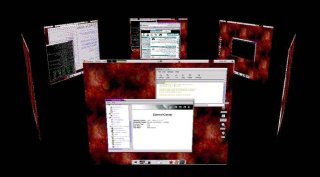 OK - back on the blogging train again, even if I have been a bit lax this week. If there's one thing you learn quickly with having too much to do, it's letting the less important things go for a while until you sort out the big things.
OK - back on the blogging train again, even if I have been a bit lax this week. If there's one thing you learn quickly with having too much to do, it's letting the less important things go for a while until you sort out the big things.Although it's not very official yet, I am actually in the process of writing a book about podcasting based on my experiences with the Java Posse podcast and hopefully getting a few more people into podcasting. Of course, I am using Ubuntu to write the book (and OpenOffice.org 2 - more about that another time). Doing this kind of thing really re-inforces the reasons I love Linux for just getting things done.
When writing (I have written a few articles for Developer.com as well) I use a really good thought organization tool called Freemind. It's a mind-mapping and outlining tool that helps me get stuff organized before putting it down on paper, and I am using the same approach on the book.
Having the mind-map right there to refer to at all times is, of course, essential to writing like this, and I like to have it full screen to get the overall picture. I also like to have Open Office Writer open full screen as well (full screen apps = less distractions - a tip I picked up from a lot of different Mac oriented sites).
The big advantage with Linux is that virtual desktops are normal, and as a result extremely well executed. I have tried virtual desktops on Windows and on the Mac and there always seem to be enough glitches to just make them a little annoying.
A virtual desktop is a bit like having a second (and third, and fourth...) monitor but without the physical monitor. You get more than one desktop, and you can switch between them instantly. I use four, and tend to keep the four screens for certain uses. Desktop one is my primary work desktop, in this case with Open Office writer running full screen on it. Desktop two is the support work desktop, in this case with the full screen mindmap on it. Flicking between these two screens is instant and mapped to keys that are very quick to switch between them. This is faster than alt-tab selection of windows (at least for me), it's just instant to switch back and forth.
Desktop three tends to be my email and org screen - gmail, google calendar and other organization apps are running on there pretty much all the time my computer is on. Desktop 4 is for web browsing and miscellaneous stuff. Linux will let me have as many virtual desktops as I want (I think compiz maxes out at 32 or something crazy), but any more than four and I really lose the muscle memory and it ends up slowing me down.
Anyway, this setup really works for me, and Linux just executes it better than any other Operating System I have used. I don't get held up, I just switch back and forth and keep the work rolling.
I must investigate if the virtual desktop options have got any better on the mac. The best I ever found for windows was JSPager, but it got broken by a windows update at one point and I just gave up. Windows just isn't my choice for getting a lot done - in fact after really clicking on Linux for a while, windows is just frustrating and awkward - it feels like wading through syrup. The Mac is obviously a lot better, and ahead in some areas, but for me (and I accept that it is just me), Linux still has the productivity edge. If you want to give virtual desktops a try, there are options for Mac OS X and Windows (incidentally - the "official" windows one that comes with the powertoys stuff is pretty bad but it might work for you - sadly JSPager seems to have disappeared into the mists of time).
1 comment:
Nicely written.
I think keeping your mail open at all times is a bad idea. To minimize interruptions, it is far better if you fix up one or two timeslots for checking and replying to mails. I'm able to concentrate better without worrying all the time about incoming information and tasks.
Post a Comment